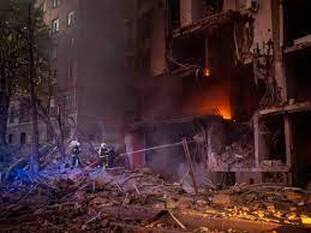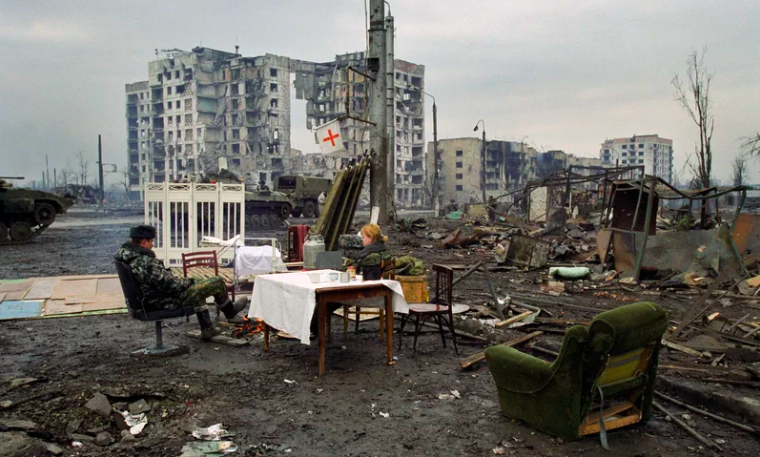“Russia’s attack on Ukraine has shocked the world with their brutal, barbaric tactics. But for a small Republic in the south of the country, the violence feels familiar.”
– Holly Young, 8th Grade
Putin’s army has attacked and bombed the urban centers of Ukraine, reducing them to rubble and forcing its citizens to flee. Russian troops flood the country, pillaging and ransacking, killing hundreds of people in their brutal takeover. The world is shocked, disgusted, but for a small province in Southern Russia, this war is reminiscent of atrocities committed against them by their own countrymen in the mid 90s.
The Chechen Republic is a small nation in Southern Russia. For hundreds of years, they have been continuously fighting for their independence from some sort of Russian Imperial power. When the Soviet Union disbanded in 1991 and Eastern European countries started to declare their own independence, they started to agitate for theirs. Tensions formed between rebel groups and the Russian government until 1994, when Russia released a full scale invasion, continuously bombing the capitol of Grozny.
The crucial thing about pointing out these parallels is that it might be a sign of what’s to come for Ukraine if Russia cannot be stopped.
The disturbing images of shelled-out buildings in major cities across Ukraine are horribly familiar, similar to images taken in Grozny at any stage in the 90s. In most wars, cities have kindled rebellions, urging citizens to resist imperialism. The effort to quell these revolutions have taken on many forms, “restoring the constitutional order,” in reference to the seizing of Grozny, “denazifying,” in reference to invading Ukraine, carried out by razing apartments and displacing and murdering thousands of people. They siege the cities that dare hold out, and bomb them until they’re unrecognizable.
The Chechen Republic is a small nation in Southern Russia. For hundreds of years, they have been continuously fighting for their independence from some sort of Russian Imperial power. When the Soviet Union disbanded in 1991 and Eastern European countries started to declare their own independence, they started to agitate for theirs. Tensions formed between rebel groups and the Russian government until 1994, when Russia released a full scale invasion, continuously bombing the capitol of Grozny.
The crucial thing about pointing out these parallels is that it might be a sign of what’s to come for Ukraine if Russia cannot be stopped.
The disturbing images of shelled-out buildings in major cities across Ukraine are horribly familiar, similar to images taken in Grozny at any stage in the 90s. In most wars, cities have kindled rebellions, urging citizens to resist imperialism. The effort to quell these revolutions have taken on many forms, “restoring the constitutional order,” in reference to the seizing of Grozny, “denazifying,” in reference to invading Ukraine, carried out by razing apartments and displacing and murdering thousands of people. They siege the cities that dare hold out, and bomb them until they’re unrecognizable.
Rebellion in Grozny was not sated until the city was essentially in ruins. That is what is worrying to many as we see how Russia grow increasingly frustrated. They essentially have two options and that is to either regress their attack or come back more aggressively than before.
Russia actually lost the first Chechen War in 1996, signing a peace treaty with Rebel Organizations and recognizing them as an autonomous nation, though still officially a part of Russia. When Boris Yeltsin stepped down and appointed Vladamir Putin as his successor, the Kremlin were still reeling from their loss and tensions were starting to form in the Russian public.
As he is now, Putin was in a spot of weakness and needed a win to secure his popularity. In 1999, after apartments were bombed and subsequently blamed on rebel forces, he reinvaded Chechnya.
In 1991, the Soviet Union disbanded and Ukraine declared its own independence, a move obviously opposed by Russian politicians. For 17 years, however, they mostly left Ukraine unbothered. In 2008, Ukraine tried to get NATO membership, and Putin did everything
in his power to stop that, even telling US President at the time, George W. Bush, that Ukraine was not a real country. Ukraine did not get their membership.
Then, in 2014, Russia invaded Crimea. The peninsula, internationally recognized as a part of Ukraine, is so overwhelmingly ethnically Russian that resistance within the people itself is undeniably absent. The rest of Ukraine is still outraged over the invasion.
Putin has used both invasions as a political weapon, using muscle, might and fear tactics to crush the nation's spirits and establish himself as more than an under qualified Soviet spy selected rather than elected as a politician. However, he is failing.
The unexpected resistance that Chechen and Ukrainian citizens have had unprecedented effects on each war. The aggression in which both peoples fought back against Russian imperialism threw the Russian Army through a loop. Both nations would have been taken much faster if it wasn’t for the normal people who knew they had to do something about this injustice.
While the parallels cannot be denied, the conflicts and their outcomes are not necessarily going to be the same. Geographically, they are nowhere near similar, and Ukraine had eight years to prepare just a little bit for this guaranteed invasion. But, knowing what could be, can help change how we set about fighting Russia.
Russia actually lost the first Chechen War in 1996, signing a peace treaty with Rebel Organizations and recognizing them as an autonomous nation, though still officially a part of Russia. When Boris Yeltsin stepped down and appointed Vladamir Putin as his successor, the Kremlin were still reeling from their loss and tensions were starting to form in the Russian public.
As he is now, Putin was in a spot of weakness and needed a win to secure his popularity. In 1999, after apartments were bombed and subsequently blamed on rebel forces, he reinvaded Chechnya.
In 1991, the Soviet Union disbanded and Ukraine declared its own independence, a move obviously opposed by Russian politicians. For 17 years, however, they mostly left Ukraine unbothered. In 2008, Ukraine tried to get NATO membership, and Putin did everything
in his power to stop that, even telling US President at the time, George W. Bush, that Ukraine was not a real country. Ukraine did not get their membership.
Then, in 2014, Russia invaded Crimea. The peninsula, internationally recognized as a part of Ukraine, is so overwhelmingly ethnically Russian that resistance within the people itself is undeniably absent. The rest of Ukraine is still outraged over the invasion.
Putin has used both invasions as a political weapon, using muscle, might and fear tactics to crush the nation's spirits and establish himself as more than an under qualified Soviet spy selected rather than elected as a politician. However, he is failing.
The unexpected resistance that Chechen and Ukrainian citizens have had unprecedented effects on each war. The aggression in which both peoples fought back against Russian imperialism threw the Russian Army through a loop. Both nations would have been taken much faster if it wasn’t for the normal people who knew they had to do something about this injustice.
While the parallels cannot be denied, the conflicts and their outcomes are not necessarily going to be the same. Geographically, they are nowhere near similar, and Ukraine had eight years to prepare just a little bit for this guaranteed invasion. But, knowing what could be, can help change how we set about fighting Russia.




